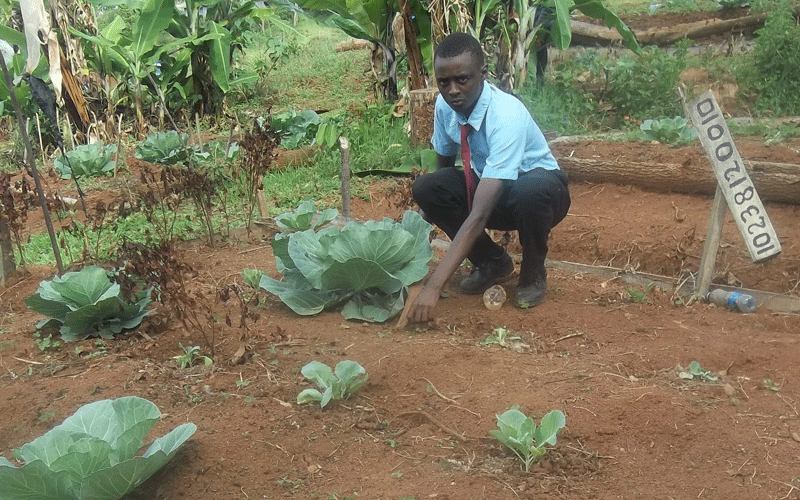Technical subjects examination fate worries secondary school teachers
By People Team, April 20, 2020Mwangi Mumero and Noven Owiti
With the continued closure of schools due to the Covid-19 pandemic, students preparing for the Kenya Certificate of Secondary Education (KCSE) 2020 exams technical subjects and their teachers have been left in limbo.
Even though all these Group Four examination subjects are not done by many students, they constitute an integral part of the education system as the government moves to boost industrialisation, food sufficiency and enhanced creativity.
Thousands of this year’s KCSE candidates are enrolled in home science, agriculture, art and design, aviation and computer studies. Others are building and construction, woodwork and metalwork.
Richard Otieno, the Kenya Union of Post Primary Education Teachers (Kuppet) Homa Bay secretary says school heads are confused on how on-going exam projects should be handled.
“The union is engaging teachers handling the affected subjects on the way forward to address the matter,” he says.
Heavy investments
Agriculture has the highest registered candidates, mainly due to the few resource demands compared to computer and aviation studies.
Given the rising popularity of agribusiness for self-employment in Kenya, the subject has attracted hordes of students across all categories of schools.
Home science – while more demanding in terms of resources than agriculture —is a favourite of girls and mixed schools. Aviation and computer studies demand heavier investments and are therefore for the well-endowed, elite high schools.
Technical subjects involve a practical project examination, which may start early in the year or close to the October- November exam period. Theory papers are done during the exam period.
In this year’s KCSE guidelines for Agriculture, schools had the option of raising at least 250 tree seedlings in a nursery per student, or rearing a goat.
Considering the cost and logistics of goat reaing, most tutors had selected tree nurseries. This project runs from early February and should be completed by end of July, with marks uploaded on the examination’s council website by the end of September.
“The candidates had prepared their nursery beds and had collectively nursed their seedlings ready for transplanting. Then schools were closed abruptly, putting the project on hold,” said a Murang’a Agriculture tutor.
Schools had invested heavily in buying seeds, red soils and other requirements.
In regions where poles and other material are scarce, students had invested their own money to procure poles, nails and beddings to construct tree nurseries.
Otieno says the practical exam in Agriculture could end in futility because students taking the subject are not in school to monitor their plots.
The seedling beds —supposed to have been transplanted by the end of March —are now overgrown, given the rains pounding the country.
The few institutions that had ventured into the goat project are bound to lose hefty sums of money considering the cost of buying ewes.
Computer studies also have an on going project which starts early in the year and culminates at the year end.
Candidates- who have been proceeding with their projects had to abruptly stop with the closure of the school.
Kuppet has sought for a rescheduling of the technical exams administered in stages but is yet to get a response from the Kenya National Examinations Council (Knec).
“We think the entire exam calendar should be rescheduled to enable students cover up for the time lost at home,” says Otieno, a teacher at Achego Mixed Secondary School , Rangwe.
Kuppet has also been calling for the postponement of all national exams, saying the environment and the anxiety created by Covid-19 were not conducive for the tests.
“Given the early closure of schools in the first term and with no chance of opening second term in good time, the best option is to postpone KCSE and KCPE exams,” says Akello Misori, Kuppet’s secretary general.
Crisis meetings
Homa Bay county Kuppet executive secretary Stephen Yogo says all national exams should be held at a time when candidates have completed the KCSE syllabus.
“Performance in the test will fall this year if no adjustment is done as most schools especially in the sub-county and county are far behind in syllabus coverage,” he says.
Knec has been holding crisis meetings to deliberate on the options available.
The exam body has already postponed the Early Childhood and Development (ECDE) and Diploma in Special Needs Education (SNE) examination that had been scheduled for later this month, an indication that both KCSE and KCPEcould be postponed.
“The pandemic has thrown schools into a crisis. Our prayer is that normalcy returns soon so that learning can resume in our schools,” adds Yogo.
However, speaking during a Covid-19 briefing by the State on Monday last week, Education Cabinet Secretary Prof. George Magoha assured Kenyans that the government has been monitoring the issue keenly, promising to advise Kenyans if the need to postpone the exams will arise.
Magoha said Education ministry officials have been holding several closed-door meetings with the concerned stakeholders.
“We are not going to risk the lives of our children because dead people don’t do exams. We will be advising parents accordingly in the next coming days about the national exams,” he said.
